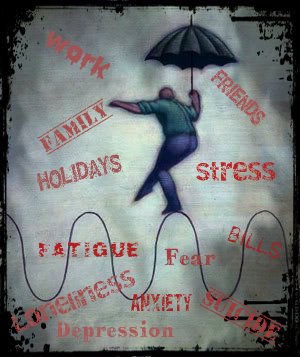Depression and Suicidal Feelings

We all have a case of the blues periodically but it is important to seek professional help if depression persists, is recurring or if suicidal feelings surface. Below is some reading material for those who are researching this subject or could use some help and support. This article emphasises what to do about depression and suicidal feelings as opposed to the reasons that cause these. Please remember that if you are feeling depressed and having suicidal thoughts, the best thing to do is get in touch with a suicide prevention outreach program as well as get counseling assistance and support.
If anyone starts feeling suicidal and it is endangering one's life, call 911 in the United States, and be hospitalized if necessary. It is better than taking one's life over something that could pass. For some it never goes away entirely, or it comes and goes. Depression hurts like a deep ache day after day, affecting quality of life and function, but there is help and the Cognitive/Behavioral Modality is the best as it facilitates a change in our way of thinking about ourselves and others.
Cognitive Behavioral Therapy uses both behavioral and cognitive applications, such as changing one's relationship to maladaptive thinking and the awareness of mindfulness. It's efficacy in treating clinical depression and other forms of mental illness is very promising. The Biopsychosocial Model proposes that the source of depression is a combination of biological, psychological, and social factors. Although the Nature/Nurture argument continues in debate, clearly genetics and the environment are both factors in mental illness. One of these can overpower the other, but never is one entirely exclusive of the other. Additionally, it is fascinating that the evolutionary theory of depression states that this condition is due to humans adapting from the 'hunting and gathering' period of our ancestry. In other words, theoretically, depression is an adjustment by which some of us turn our aggression inwardly. The key here would be to find healthy and constructive forms of allowing this inner aggression to channel itself, such as sports or something creative.
Interpersonal Psychotherapy is also a treatment modality that has a proven track-record. This is a structured and supportive one on one approach with a therapist that incorporates Cognitive Behavioral Therapy methods into the treatment. A good therapist that uses this method is very helpful. Be careful to choose the right professional for your needs. It is important to find one whom you will be comfortable with and that measures up to the standards that are expected of a therapist. Check the therapist out thoroughly and only go to a qualified person that is experienced and referred to you. Research ratings online and if there are any complaints filed with the Department of Consumer Affairs. The problem is, a professional therapist is expensive, unless one has insurance or other program that will cover the counseling. A support group is a viable alternative for keeping expenses down, but it is important that it emphasises Cognitive Behavioral Therapy.
Although there are many different approaches and techniques in Cognitive Behavioral Therapy, and since everyone is different, one has to find what works best on an individual basis. Ideally, it is both Interpersonal Therapy and a Support Group using Cognitive Behavioral Therapy that is most helpful to overcoming depression. One can also choose a specific support group, such as for depression, fibromyalgia and so forth. There are many good support groups online, but it is good to go to a group in person as isolation is often a part of the contributing factors to depression.

Pharmaceuticals in conjunction with therapy and a support group is sometimes necessary but hopefully not for the long-term. For this one would need to see a qualified Psychiatrist. There are some who may need medication for the rest of their lives if nothing else helps permanently. There are alternatives to harsh chemicals, such as homeopathy, herbs, massage, acupuncture and talk therapy. This should all be done with a qualified health-care practitioner's guidance and counseling. There is no shame however, if one needs to resort to stronger methods, such as prescription medication. It is important this be done with great diligence and informed caution due to any possible side effects. The benefits should outweigh the risks.
As an Occupational Therapy Practitioner, I believe that the holistic approach to a healthy life-style is part of an integrated and complementary approach to healing. This means incorporating work, play, recreation and rest into one's life and reducing stress. Positive thinking and engaging in a productive activity is very beneficial to overcoming depression. This is anything from one's work to a hobby that is enjoyable. The important thing is that we engage and interact with our environment and that it be something that we like to do, or that the more we are active in it, we will start to feel better. This is one of the key principles in Occupational Therapy; that through meaningful occupation one's health and well-being improves on every level. This doesn't mean that anyone should go out and attempt to run a marathon. It simply is to encourage one to take the first steps toward doing something that is enjoyable and productive. Maybe it is a hobby, or something that one has always wanted to do but hasn't yet. Volunteer work is another way to boost one's mood because it not only distracts one from personal problems but boosts self-esteem.
Socializing with supportive people is also conducive to a more positive and healthy outlook on life. This is often accomplished through the safe structure of a support group and getting together with family or friends whom one feels comfortable. The important thing is that action be taken to get out more, but in steps that are not overwhelming. There are also clubs, social groups and many other possibilities available. One only need Google what one's interests are to discover an array of these, many of them free.
Life-style changes such as a healthy diet and moderate exercise is a must to overcoming depression. Also, the right amount of quality sleep. Sleep disorders and deprivation is one of the main contributors to depression and other illnesses. It is crucial that one's life habits be looked at for sources of depression. Always remember that balance and moderation is the key in a healthy life-style. Certain things, such as caffeine and alcohol consumption may also be triggering depression as well. Food allergies and sensitivities are possible contributing factors, so it is well worth checking into with a health care practitioner if one suspects this is the case. In fact, it is a good idea to have a complete physical exam to rule out any medical conditions that cause depression. Thyroid and other hormonal imbalances, anemia and vitamin deficiencies are among some of the physical causes of depression. Environmental factors are another possible trigger, such as pollution and products for skin and hair.
There are many reliable resources online and otherwise for help with depression and suicidal feelings. Please contact these for more information and referrals. One may also reach them through the websites and write or call them. Phone numbers and addresses are on the website, as well as email contact information. One website is below:
Understanding Depression: ifred.org/
National Alliance for the Mentally Ill. nami.org

Interesting article on depression, a very good read :-) I would say from a personal stand point I have had very bad experiences with traditional therapy whether it be talk therapy or cbt, it seems to be very often now being prescribed for absolutely everything, which from a practical point of view makes no sense whatsoever, it would be impossible that one form of therapy can handle everything, the same goes for pharma products, which can also have a sinister edge to them as well, that said for anyone these things have worked for then all power to them, we have to find help wherever it is possible to find it, thats just my personal experiences and views. Practical help though that you suggested has for me always been the most powerful thing, which circumstances or day to day life shifts I always see a dramatic change in my day to day health which shows that these aspects massively effect your overall wellbeing, I don't doubt that for a second. It sounds to me from the little I know of occupational therapy that this may be a far better form of therapy than these other ones as is it looks at empowering the individual, and very often those with mental health issues suffer a major and chronic shortage of control over there own lives, anything that can address that shortfall must be massively positive :-)
Yes, the goal of any kind of therapy should be to empower the person. As far as type of therapy, it's whatever works! Some do well with CBT, and others just with talk therapy. Others don't do well with talk therapy or digging up past traumas. There's so much out there in terms of therapy that it's a virtural smorgasbord of therapies to choose from. Occupational therapy is self-empowering because it's entire goal is to help the patient become more self-reliant and as high-functioning as possible and to maintain that as long as they can. Of course, a lot of it has to do with the therapist and it's important to find one that is good. I personally have also had several bad experiences with therapists I went to for some of my own issues. It's rare that one finds a really good one.
Yes I agree with that, was there one type of therapy or treatment that you found most helpful for your own personal issues? (if you don't mind me asking) :-)
Truthfully -- nothing in recent years. I went through a years of not finding a good therapist and after several disappointments and let-downs, I realized what direction I didn't want to take and that I was my own best help. This may not work for everyone, but my ultimate realization was that I was the only one who could really help myself. Maybe I outgrew therapy, and besides it rarely told me anything I didn't know already. Sure there were some good, reinforcing suggestions, but looking back it was a Jungian therapist that was the best for me. I think that this is because they also focus on the spiritual aspect of our being, as well as practical. It's a potpourri of what works for me and that's what I've been applying to myself for years now, and it seems to be helping. Obviously I can't go into a lot of detail here but the bottom line is really "Physician, heal thyself". We all have that capacity within us and once we realize and understand that responsibility for our own recovery and healing, it makes all the difference. I'm also finding that a balance in my life is crucial -- a lot of it the very occupational therapy principles that I study and know, applied to myself. Writing also helped me a lot, as a means of self-expression and venting. A lot of poetry -writing, of which I have also used therapeutically with others.
I agree about writing for certain, without writing I very much doubt I would still be alive to be honest, it has kept me going through horrific times, creativity is always so helpful :-)